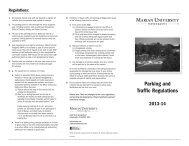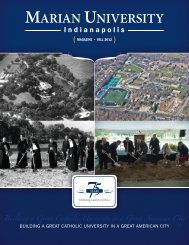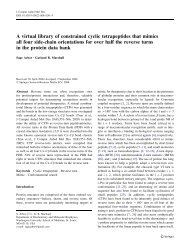2009-11 Marian University Course Catalog, fall 2010 edition
2009-11 Marian University Course Catalog, fall 2010 edition
2009-11 Marian University Course Catalog, fall 2010 edition
You also want an ePaper? Increase the reach of your titles
YUMPU automatically turns print PDFs into web optimized ePapers that Google loves.
PHY 330<br />
Electricity and Magnetism 3 credits<br />
Prerequisite: MAT 315 and PHY 212 or permission. A more<br />
rigorous approach to the foundations of electromagnetic<br />
theory. Classical electrodynamics and the theory of radiation,<br />
Maxwell’s equations, magnetism, theory of synchrotrons and<br />
cyclotrons. Three lecture hours per week. (ADD)<br />
PHY 370<br />
Analytical Mechanics 3 credits<br />
Prerequisite: MAT 315 and PHY 212 or permission.<br />
Foundations of classical mechanics: the Lagrangian<br />
formalism, Hamilton-Jacobi theory, canonical<br />
transformations, and variational methods. Three lecture<br />
hours per week. (ADD)<br />
PHY 380<br />
Special Topics 1-3 credits<br />
Prerequisite: PHY <strong>11</strong>1. Special courses in physics in response<br />
to student needs. (ADD)<br />
PHY 410<br />
Current Topics in Physics 3 credits<br />
Prerequisite: MAT 310 and PHY 212. Current developments in<br />
physics including nuclear theory, elementary particle theory,<br />
supersymmentry, and string theory. Three lecture hours per<br />
week. (ADD)<br />
PHY 498<br />
Directed Research 2-4 credits<br />
Prerequisites: Junior or senior major and instructor<br />
permission. This course is designed for junior or senior<br />
students to design and implement research projects or to<br />
investigate topical issues in the field of physics. (SEM)<br />
PHY 499<br />
Independent Study 3 credits<br />
Prerequisites: Junior or senior standing and permission.<br />
Guided readings and research. (ADD)<br />
POL 101<br />
Introduction to Political Science 3 credits<br />
A look at the nature, concepts, and terms of political science<br />
and its four major subfields: American government, political<br />
theory, international relations, and comparative politics.<br />
Principles studied here are applied in analyses of current<br />
events in the United States and around the world. This course<br />
partially satisfies the general education requirement in the<br />
individual and social understanding category. (SEM)<br />
POL 102<br />
Introduction to American Politics 3 credits<br />
Introduction to the basic features and processes of American<br />
government and politics. Examines the underlying<br />
assumptions of American democratic theory and political<br />
thought, the constitutional framework, and its political<br />
institutions (the Congress, the presidency, and the courts).<br />
Political parties and interest groups, voting behavior, public<br />
policy formation, and foreign policy are also discussed. This<br />
course partially satisfies the general education requirement<br />
in the individual and social understanding category. (SPR)<br />
POL 155<br />
Introduction to Peace Studies 3 credits<br />
An introduction to the study of peace and non-violence, with<br />
a special emphasis on the perspective of political science. The<br />
course is divided into two parts: the first will focus on<br />
important classical texts and historical cases that address<br />
issues of peace and non-violence; the second part will focus<br />
on current controversies in these areas. (2SO)<br />
POL 205<br />
Social Science Statistics 3 credits<br />
See SOC 205. (FAL)<br />
POL 210<br />
Introduction to Comparative Politics 3 credits<br />
Prerequisite: 101 or permission. Comparative examination of<br />
political institutions and behavior across countries in Europe,<br />
Asia, Latin America, and Africa. Surveys the different types of<br />
political systems found in the contemporary world, including<br />
various forms of democracy and dictatorship. Students learn<br />
how power is legitimized through the organization of politics<br />
and how political life varies from country to country. (2FO)<br />
POL 220<br />
Introduction to International Relations 3 credits<br />
Prerequisite: 101 or permission. Examines the international<br />
system of sovereign states, including conflictive and<br />
cooperative relations between states and the relationship<br />
between states and international organizations such as the<br />
United Nations. International law and human rights, the role<br />
of non-governmental actors, and international economic<br />
relationships are also introduced. (2SE)<br />
POL 230<br />
Introduction to Political Theory 3 credits<br />
Prerequisite: 101 or permission. Examines thinkers and<br />
themes central to the study of political theory. Addresses<br />
topics such as the emergence and growth of modern<br />
ideologies (liberalism, socialism, communism, fascism); war<br />
and peace; political loyalty and obedience; justice, freedom,<br />
and power. (2FE)<br />
POL 301<br />
Social Science Research 3 credits<br />
See SOC 301. (SPR)<br />
POL 324 3 credits<br />
Global Religion and American Politics<br />
Reflection on religion in the modern world has operated for<br />
the most part under the assumption of its decline. The late-<br />
20 th century changed all that: political scientists of all<br />
different approaches and persuasions agree that a kind of<br />
120

















